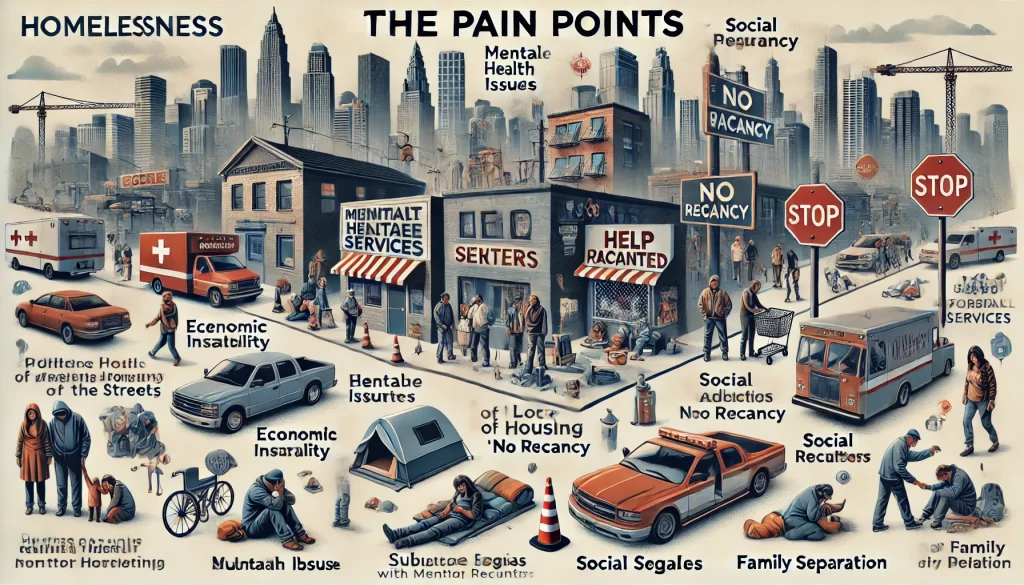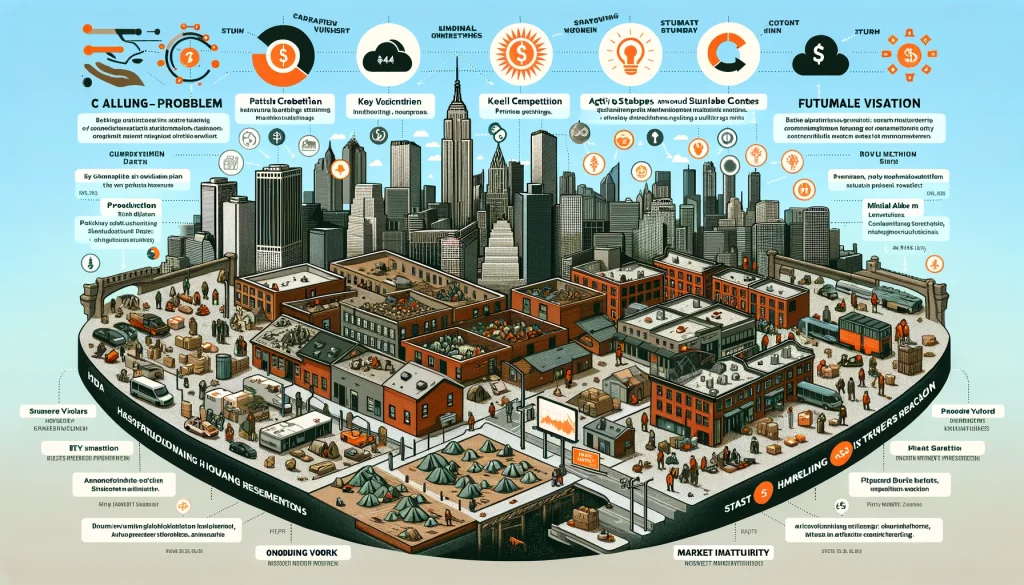Problem Statement
Homelessness is a critical issue affecting numerous cities globally, characterized by individuals and families lacking stable, safe, and adequate housing. This problem stems from various factors, including economic instability, mental health issues, substance abuse, and a severe shortage of affordable housing. Homelessness not only directly affects those without shelter but also imposes significant burdens on the broader community, increasing the demand for social services, healthcare, and law enforcement. The absence of stable housing exacerbates health problems, limits employment opportunities, and perpetuates cycles of poverty and instability.
Pain Points
- Economic Instability: Unemployment and low wages contribute to homelessness.
- Mental Health Issues: Inadequate mental health support leads many to homelessness.
- Substance Abuse: Addiction issues often result in loss of housing.
- Lack of Affordable Housing: High housing costs and low availability leave many without homes.
- Healthcare Access: Homeless individuals struggle to access essential healthcare services.
- Safety Concerns: Homelessness exposes individuals to violence and unsafe conditions.
- Social Stigma: Homeless individuals face discrimination and isolation.
- Employment Barriers: Lack of a stable address makes securing employment difficult.
- Legal Issues: Homelessness often leads to legal problems, including fines and arrests.
- Family Separation: Homelessness can result in families being split up, affecting children’s wellbeing.

Future Vision
The vision for addressing homelessness focuses on creating a comprehensive, integrated approach that provides stable, safe, and adequate housing for all. This includes increasing the supply of affordable housing, enhancing mental health and substance abuse support services, and providing robust economic assistance programs. By adopting a holistic approach, the goal is to reduce the incidence of homelessness, improve health and safety for vulnerable populations, and foster community resilience. Collaboration between government agencies, non-profits, private sector partners, and the community is essential to implement sustainable solutions and ensure that everyone has access to secure housing.
Use Cases
- Affordable Housing Initiatives: Developing new affordable housing units to meet the needs of low-income individuals and families.
- Mental Health Services: Expanding access to mental health care and support for homeless individuals.
- Substance Abuse Programs: Providing comprehensive addiction treatment and recovery services.
- Job Training and Placement: Offering employment training and job placement services to help homeless individuals gain stable employment.
- Healthcare Access: Establishing clinics and mobile healthcare units to provide essential medical services.
- Emergency Shelters: Creating safe and secure shelters for immediate housing needs.
- Permanent Supportive Housing: Developing long-term housing solutions with ongoing support services.
- Community Outreach: Engaging with homeless individuals to connect them with services and support.
- Legal Assistance: Providing legal aid to address fines, arrests, and other legal issues related to homelessness.
- Family Reunification Programs: Assisting families in reconnecting and providing stable housing solutions.
Target Users and Stakeholders
Target Users
- Homeless Individuals and Families
- Age Group: All ages
- Gender: All
- Usage Pattern: Daily engagement with housing resources, healthcare, and support services.
- Benefit: Access to stable housing, healthcare, and support services, reducing the impact of homelessness.
- Low-Income Individuals
- Age Group: 18-65 years
- Gender: All
- Usage Pattern: Frequent interaction with affordable housing programs and economic assistance.
- Benefit: Access to affordable housing and economic support, preventing homelessness.
- Substance Abuse Patients
- Age Group: 18-65 years
- Gender: All
- Usage Pattern: Regular interaction with addiction treatment and recovery services.
- Benefit: Access to comprehensive addiction treatment and stable housing during recovery.
- Individuals with Mental Health Issues
- Age Group: 18-65 years
- Gender: All
- Usage Pattern: Frequent use of mental health support services and housing programs.
- Benefit: Access to mental health care and stable housing, improving overall well-being.
Stakeholders
- Government Agencies: Responsible for policy-making, funding, and implementation of housing and support programs.
- Non-Profit Organizations: Provide services, support, and advocacy for homeless individuals.
- Private Sector Partners: Engage in public-private partnerships to develop affordable housing and provide funding.
- Community Organizations: Local groups involved in outreach, support, and community-based solutions.
- Healthcare Providers: Deliver essential medical and mental health services to homeless populations.
Key Competition
- ShelterTech: Provides technology solutions for homeless shelters to improve services and access.
- Weingart Center: Offers comprehensive services including housing, job training, and health services for homeless individuals.
- PATH (People Assisting the Homeless): Focuses on permanent housing solutions and support services.
- Coalition for the Homeless: Provides housing, advocacy, and support services.
- Homeless Outreach Program Integrated Care System (HOPICS): Offers integrated care services for homeless individuals, including housing and healthcare.
Products/Services
- Emergency Shelters: Temporary housing solutions providing immediate relief and safety.
- Permanent Supportive Housing: Long-term housing with integrated support services.
- Mental Health Care: Access to mental health professionals and treatment programs.
- Addiction Treatment: Comprehensive substance abuse treatment and recovery programs.
- Job Training and Employment Services: Programs to help homeless individuals secure stable employment.
- Affordable Housing: Development of new housing units with affordable rent.
- Healthcare Services: Mobile clinics and community health centers providing essential medical care.
- Legal Aid: Assistance with legal issues related to homelessness.
- Economic Assistance Programs: Financial support for low-income individuals and families.
- Family Reunification Services: Programs to help reunite homeless families and provide stable housing.
Active Startups
- Samaritan: Mobile app connecting homeless individuals with community resources and financial support.
- HandUp: Crowdfunding platform to raise money for homeless individuals and support services.
- Homeday: Platform providing shared housing solutions for homeless individuals.
- Propel: App that helps low-income individuals manage and improve their financial situation.
- RentPath: Online platform connecting people with affordable rental housing.
- PadSplit: Provides affordable shared housing solutions.
- HomeLink: Digital tool helping caseworkers manage and support homeless clients.
- Landing: Offers flexible rental leases in fully furnished apartments.
- OpenPath: Mobile solution providing real-time data on shelter availability and resources.
- StreetSmart: App providing location-based services and support for homeless individuals.
Ongoing Work in Related Areas
- Affordable Housing Initiatives: Efforts to build and maintain affordable housing units.
- Mental Health and Substance Abuse Programs: Expanding access to treatment and support.
- Employment and Job Training: Initiatives to improve employment opportunities for homeless individuals.
- Healthcare Access: Programs to provide essential medical care to homeless populations.
- Policy Advocacy: Efforts to change laws and policies to better support homeless individuals.
- Community Outreach: Engaging with homeless individuals to provide resources and support.
- Public-Private Partnerships: Collaborations to develop innovative housing solutions.
- Research and Data Collection: Studying homelessness to inform better policies and programs.
- Technology Solutions: Developing apps and platforms to connect homeless individuals with resources.
- Education and Awareness: Programs to raise awareness about homelessness and mobilize community support.
Recent Investment
- January 2024: $50 million investment in ShelterTech to enhance technology solutions for homeless shelters.
- February 2024: $75 million funding for PATH to expand permanent housing projects.
- March 2024: $60 million investment in Samaritan to scale their mobile app connecting homeless individuals with resources.
- April 2024: $80 million funding for HandUp to grow their crowdfunding platform for homeless support.
- May 2024: $100 million investment in Homeday to develop more shared housing solutions.
Market Maturity
The market for homelessness solutions is gradually maturing, driven by increasing awareness and the urgent need for effective interventions. Investments in innovative technologies and community-based programs are rising, and there is a growing collaboration between government, private sector, and non-profits. Despite challenges, such as inadequate funding and policy barriers, the market is evolving with a focus on sustainable, scalable solutions. Public awareness campaigns and policy advocacy are gaining momentum, further supporting the market’s growth. Overall, the sector shows promising potential for impactful change, but sustained effort and investment are necessary to achieve long-term success.
Summary
Homelessness remains a pervasive issue affecting many cities worldwide, driven by economic instability, mental health issues, substance abuse, and a severe shortage of affordable housing. This crisis not only impacts those without homes but also burdens the broader community by increasing the demand on social services, healthcare, and law enforcement. Addressing homelessness requires a multifaceted approach, including developing affordable housing, expanding mental health and addiction support, and providing robust economic assistance.
The competitive landscape includes organizations like ShelterTech, PATH, and the Coalition for the Homeless, as well as innovative startups such as Samaritan and HandUp. Recent investments highlight a growing commitment to solving homelessness, with significant funding directed towards technology solutions, affordable housing projects, and comprehensive support services.
The market for homelessness solutions is maturing, with increased awareness and collaboration among various stakeholders. The vision for the future involves creating a comprehensive, integrated approach to provide stable, safe, and adequate housing for all, reducing homelessness, improving health and safety, and fostering community resilience. Sustained effort, investment, and collaboration are essential to achieve meaningful and lasting change.



